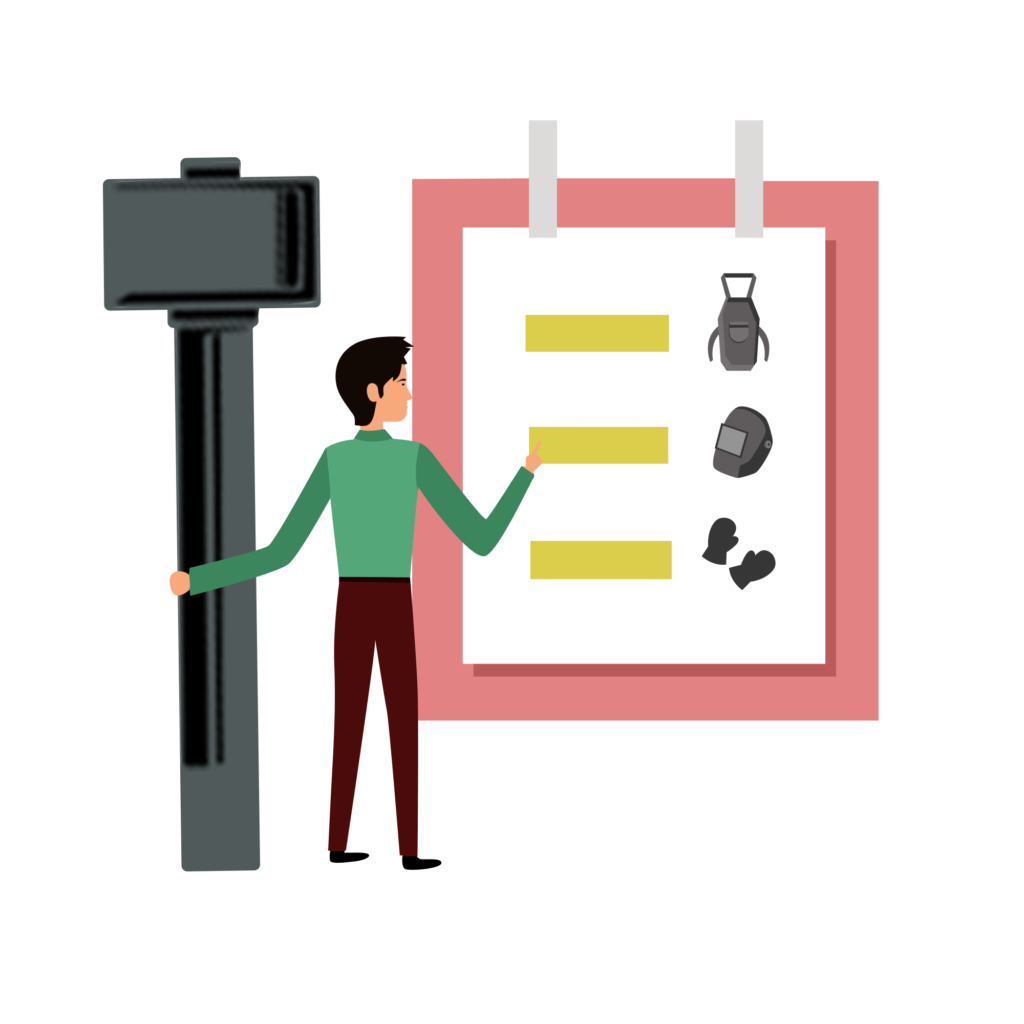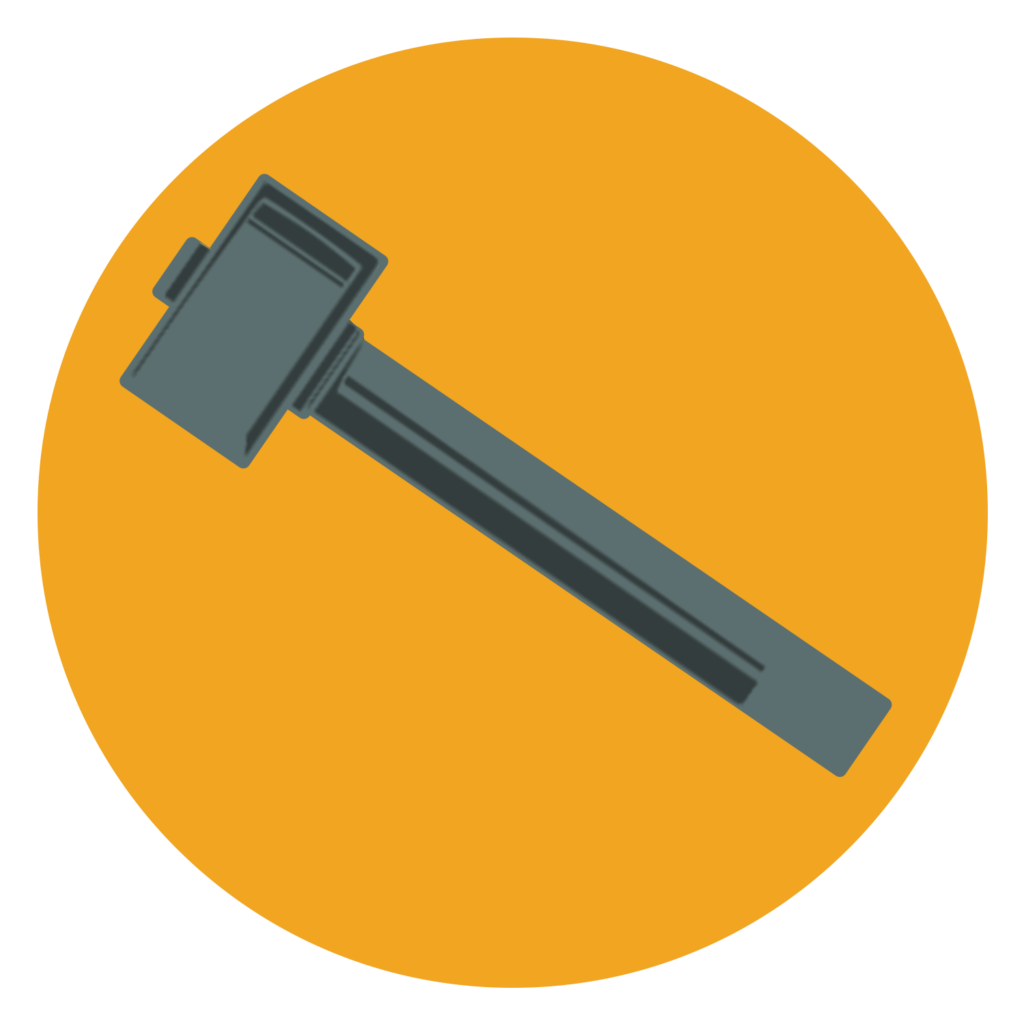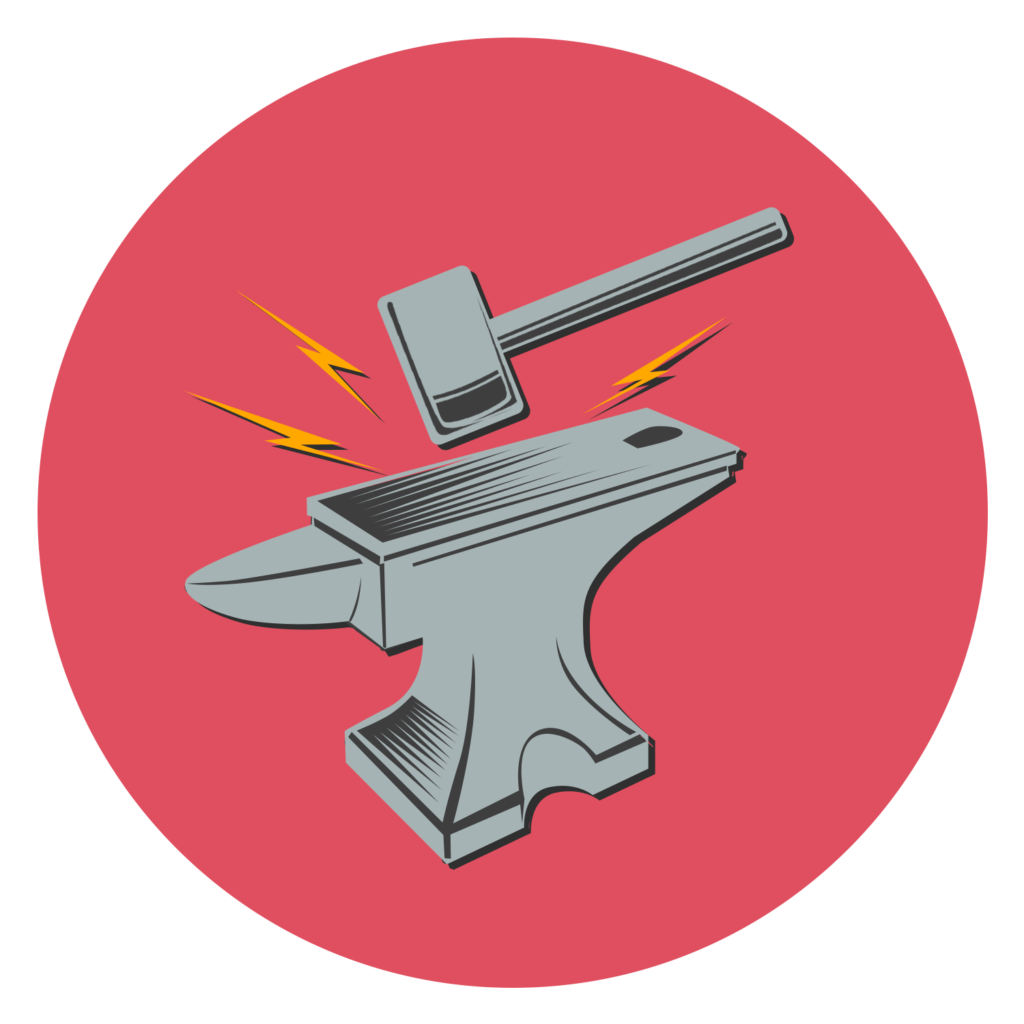You have been apprenticing for a while or just blacksmithing as a hobby, and you have now decided that you want to build your blacksmith workshop, but you are lost about where to start from. As usual, we are here to help you.
Owning your blacksmith shop is a giant step in your blacksmithing career. It gives you a place to carry out all your activities, improve your professionalism, and help you get started with independent operations.
The idea of building your own blacksmith workshop can seem tasking, and you might lose interest in doing this even before setting out; but with a good plan and a reasonable budget, you can successfully achieve this without much stress.
In this guide, you will find everything you need to know to help you build a blacksmith shop without any hassle. This guide is practical and easy to follow.
This step-by-step guide, if followed carefully, should help you achieve that blacksmith’s shop you’ve always dreamt of all this while.

Table of Contents
What You Need To Start a Blacksmith Shop
Introduction
The process of setting up your blacksmith shop must start with a plan. This plan includes preparing your mind on the things you need to function effectively in your blacksmith shop.
There are several tools and materials in a blacksmith shop. Some of them must be present before you think about starting the shop while some others can come in the long run.
We all know the secret of getting ahead is getting started. But you must as well seek a convenient point to start. You can always work within your budget to get the tools and materials you need to kick off.
In this chapter, you will learn about the essential things you need to get started with your blacksmith shop and gain insight on the available workshop site options.
You will also know about the basic dimension and best layout of a good blacksmith shop. It will also help you to make the right consideration for the best blacksmith shop’s size.
But before we delve into details, it is best to let you know why you need a blacksmith shop. It is also crucial to clarify if you are fit to own a blacksmith shop or not.

Why Do You Need A Blacksmith Shop?
While thinking about how to set up a blacksmith shop, you should also understand why you need a blacksmith shop. When the purpose is not known, abuse and defect is inevitable.
Like corporate professionals work in an office, blacksmiths also carry out their workshop tasks in a large space. Although you can practice in a home blacksmith shop and in other open spaces around you, having a workshop makes you more professional.
Imagine a teacher without a classroom or a religious head without a worship center. The concept of blacksmithing (especially as professionals) is not complete without having a blacksmithing shop.
Here are some of the reasons why you might have to get a blacksmith shop if you are yet to have one.
- It helps you to be more organized and professional.
- It provides you with a space that acts as your official contact point with clients and potential clients.
- This space enhances the blacksmithing processes to be relatively more comfortable and smoother.
- It offers a convenient space where you can exhibit your skills, keep your tools, and organize your products.
- A suitable blacksmith shop will create the right work environment even for individuals that intend to learn.
Available Blacksmith Workshop Site Options
When thinking about building your blacksmith shop, you first need to consider if you will be renting a place or building one yourself. A favorable consideration will be to build one from scratch because that way, you work with a plan from scratch and you can easily add the features you need.
Renting, on the other hand, will most likely not have all the things you need, because whoever owns the place was probably not thinking about blacksmithing when it was built.
Some features are critical to a great blacksmith’s shop, and so, if you have to rent, you will need to do some renovations. The renovations are also essential if you have an existing place that you intend to convert to a blacksmithing shop.
While building or renovating a place to make it a blacksmith shop, you need to keep something in mind. A blacksmith shop has its suitable interior that makes tasks easy and smooth.
Building a blacksmith shop is quite easy if you know the right things to do. It is also essential to take the process a step at a time.
After making these considerations, you can decide on which of them suits your budget and proposed size.
What is a Good Size for Blacksmith’s Shop?
Blacksmithing is one of the most prolonged standing professions in human history. It is one of the highest artistic jobs that still play a vital role even in the modern day. With many enthusiasts going into the business daily, there are no indications that the trade will fade off anytime soon.
A common desire with most apprentices or new blacksmiths is to have their blacksmith’s shop. Even existing blacksmiths with a workshop often think of changing or expanding their shops due to some reason.
One of the significant considerations in getting a blacksmith’s shop or changing a blacksmith shop is the size of the shop. As much as you need to manage space, a blacksmith shop should neither be too big nor too small. The layout of a home blacksmith workshop can slightly vary but it should be large enough to accommodate all tools and facilities with enough space available for other tasks.
The ideal size of a standard blacksmith workshop depends on many factors such as size of open space, personal preferences, location, and tool sizes. Nevertheless, there are average sizes that serve as a reference for the ideal size of a blacksmith’s shop. On average, a 12 x 14-foot dimension is considered to be suitable as a blacksmith’s shop.
However, as your skill grows, you might need more tools; hence, a bigger workspace. If you have open space around your blacksmithing workshop, you can create an additional area by extending the roof of your shop or creating an extra workspace in the backyard.
Everyone loves to work in a spacious environment. But as much as they would like to get enough space to establish themselves, certain factors can influence the size of the blacksmith’s shop.
Factors That Can Affect the Size of a Blacksmith’s Workshop
Several factors influence the size of a blacksmith’s workshop. These factors include;
Available Space
Most blacksmiths decide how big or small their shop will be depending on the open space. Some desire a bigger shop, but they are limited by the available space, while other areas that are large enough for them to build workshops just as they want.
If you are renting a place, you might have to deal with a fixed size. Buying a space still affords you the luxury of slight flexibility.
Overall, the available space is undoubtedly a major influence when it comes to the size of your shop.
Number of Tools
How many tools do you have or are willing to get in the long run? Are you hoping to explore the blacksmithing trade to the fullest? Do you want your blacksmith shop to accommodate all your tools without any need for a store house?
The answers to the questions above are crucial to determining the size of your blacksmithing shop.
The number of tools you have can also determine the size of your workshop. This factor practically explains why most beginners settle for medium to small-sized shops while experienced professionals with more tools keep expanding.
Preferred Layout
What is your dream and preferred layout for your blacksmith shop? The layout preferred by the blacksmith in question can also affect the size of the workshop. This factor is one of the personal factors that affect the size of a blacksmith’s workshop.
The layout includes the design and allocation of spaces. Extra features like resting spots, coffee arena, store rooms, etc. are also key parts of the layout.
Financial Ability
Everything about the size of the blacksmithing shop comes at a cost ranging from the cost of acquiring a space to the cost of developing the area. The larger the workshop you want to build, the more the cost of setting it up. Therefore, most blacksmiths opt for the most cost-effective workshop size.
What size is suitable for a blacksmith shop is one of the few blacksmithing questions that have no definite answer. However, you must ensure that your workshop has enough space to accommodate you and your tools. You should remember you need enough space to store your tools, carry out repairs, dumpsite, and also an area for your forging processes.
Nevertheless, everything comes at a cost. Depending on the size of the shop you want, the plan and layout you want to give to it, the price also varies as the choices. However, we can have an overview of the average cost of setting up a blacksmithing shop.
Things to Consider Before Starting A Blacksmith Shop
You must make certain considerations before proceeding with your blacksmith shop. These considerations will help you meet your needs and make decisions that suit your needs.
Below are some of the things you need to consider before starting your blacksmithing shop. they will help you to meet your custom needs and other requirements.
1. Why you need a blacksmith shop
Do you just need a blacksmith shop to act as a workplace or you want something more? It is essential to know what you want before going ahead to create your blacksmith shop.
The purpose you want your shop will affect almost everything about it. This factor will affect the size, layout, design, and other essential features of the shop.
2. Your Budget
Another essential thing to keep in mind before starting your blacksmith shop is your budget. Sometimes you desire more than what your budget can handle, but it is best not to overshoot. You don’t have to run into debt or exhaust your entire savings just to set up your blacksmith shop.
Have a budget in mind and ensure that everything you are doing is within your budget range. Start with the essentials before moving on to get the luxuries.
3. Types of Projects
Do you intend to work on small metal pieces, handle large metal pieces, or both? It is best for a blacksmith to have an area of specialization. This specialization will influence the setup of the blacksmith shop.
For instance, the needs in a goldsmith shop are different from a bladesmith or whitesmith. It is not advisable to optimize your setup to suit most projects you would be handling.
4. Expected Number of People to Use the Shop
Another thing to keep in mind is the number of people you estimate to use the shop. Are you starting alone or you are teaming up with another blacksmith?
Do you hope to take up students in the long run? Ensure to make provisions to accommodate all these people while starting your blacksmith shop.
Who Should Start A Blacksmith Shop?
Are you wondering if you are fit to set up your blacksmith shop? You can start a blacksmith shop as long as you’ve completed your blacksmith apprenticeship and you have the right skills.
It doesn’t matter if you are a hobbyist or you take up blacksmithing as a career. You need a blacksmith shop if you want to keep practicing various blacksmith projects.
The only difference is that blacksmith shops for hobbyists are different from that of professionals. The features in a professional blacksmith shop are optimized for commercial purposes.
You will know you are fit to start your blacksmith shop when you complete your apprenticeship. Likewise, you must be able to complete most blacksmith projects with little or no support. Once you have the right skill and mentally prepared, you can move on to starting your blacksmith shop.
Summary
Starting a blacksmith shop is a huge step in the right direction for blacksmiths. It often marks the beginning of their career as a self-established blacksmith. But the decision to start a blacksmith shop is only one step in many.
It is vital to understand the essential things you need before you start and know why you need a blacksmith shop in the first place. Also, you must decide on the size of the blacksmith shop that best suit your needs based on the available space and your budget.
Step by Step Guide to Starting Your Blacksmith Shop
Introduction
Starting a blacksmith shop is not a day’s job. It is a stepwise decision that starts with the desire and need to start your blacksmithing shop.
By now, you should understand the essentials you need to start a blacksmith shop. You should know the right factors to consider before starting the shop. Also, you can now judge if you are fit enough to start a blacksmith shop.
In this chapter, we will move on to the practical actions of starting your blacksmith shop. It will help you through stepwise procedures of setting up.
Also, in this chapter, you will learn how to design the best layout for blacksmith shops. It will cover the factors to consider before designing the layout of your blacksmith shop.
Let’s roll!

How to Work Out the Best Layout for Your Blacksmith Shop
Blacksmith shop setup is a major step in the mind of many blacksmiths as soon as they are done with their apprenticeship or when they want to start their own blacksmithing business. Also, they usually focus on the cost of getting a space and the needed tools.
However, as much as space and tools are essential, so is the layout you should give your workshop. The plan can go a long way in determining a lot of things relating to the ease of working in the shop.
Although the layout design is more of a personal thing because you can choose a design that suits you, however, you must put the necessary factors into consideration. The ceiling, floor, doors, lighting, electricity are all essential parts of the blacksmith workshop layout.
Proper layout will help you with effective space management. Even when you have a small space, using the proper layout will help it to accommodate more designs, features, and tools.
Regardless of the space you have, you can craft out a good blacksmith shop layout plan. You can mitigate the hassle of working out a perfect layout when you make the right considerations.
Here are tips on how to work out the best plan for your workshop;
Consider the Available Space
The amount of space you have is a huge determinant when it comes to a suitable layout for your blacksmith shop design. If you have ample space to accommodate all possible configurations, then you are lucky. But if you have only a limited space, then you might have to manage the area effectively.
Space will determine how many sections you can partition your shop, the size of your forge, door size, and so on.
Doors
First off, understand that doors perform two core roles. They help to aid easy movement of humans and materials even in case of emergencies. They also aid ventilation within your work space.
You should ensure that the size of your entry is big enough for a smooth movement of tools and materials in and out. It is also good to have two doors in case of emergency and also to allow seamless access to the front and backspace of the workshop.
Likewise, the positioning of the door should be strategic. Ensure that you place the doors where they can also help with the ventilation of your shop.
Ceiling
Aside from the type of roof you want to use, another factor to consider in your layout is the height of the ceiling. The height of your ceiling should be in the range of 8.5-10 feet. The height of the roof will make it easier to get rid of the heat from the forge.
An appropriate roof height will also enhance ventilation and mitigate the vulnerability of fire outbreak.
Lightning and Ventilation
Lightning and ventilation can go hand in hand if you are considering making use of natural ventilation and natural lighting.
You should include a sizable window that will allow enough air and natural light. You can also explore other ventilation options. The role of ventilation is vital to your health. Some of the needs for proper ventilation in your blacksmith shop include;
- Without appropriate ventilation, toxic gasses like carbon dioxide and carbon monoxide will remain trapped indoors.
- Proper ventilation will help you regulate the temperature in your workspace.
- It will ensure that the environment is energy-efficient, safe, and healthy.
- Proper ventilation aids the exchange of indoor and outdoor air to get rid of pollutants and toxic gasses.
Choose Suitable Construction Materials
The choice of construction materials can also influence the layout. The best materials to use are concrete and iron. Wooden structures are not advisable because of the ease of catching and escalating fire outbreaks. The door, floor, and ceiling types are also part of the construction materials to consider.
Most times, the layout given to the blacksmith’s workshop is greatly influenced by the personal preference of the blacksmith. However, there are general tips that can help you achieve the best layout, even with limited space available. The doors, ceiling, number of sections, or partitions, as well as type of construction materials, are all influential in determining suitable layouts.
Also, each of the general layout tips above gives functionalities that will make the workshop easier for blacksmithing works and less prone to accidents or hazards.
While working on the layout and plan of a blacksmithing shop, another thing that comes to mind the size. The size of a blacksmith’s shop is very influential on its functionality, as well as the type of layout that it will accommodate.
Essential Tools you Need To Start a Blacksmith Workshop
One of the mistakes most upcoming blacksmiths make is waiting to have all blacksmithing tools before setting up a blacksmith shop. This is a wrong notion because you can start your blacksmith shop as soon as you have some essential tools.
You can start a blacksmith shop with only the essential tools. These tools are all you need to carry out the basic blacksmithing processes.
The necessary tools for starting up a blacksmith workshop include;
Other smaller tools are;
- Chisels, drifts
- Center punches slitters
- Twisting tools
- Lots of scrap metals
You can continue to acquire other bigger tools as you advance in the blacksmith process. Some other tools that blacksmiths use include;
- Grinders
- Belt sanders
- Spray guns
What Are the Costs Of Setting Up A Blacksmith Workshop?
Many people are fascinated with the entire concept and craft of blacksmithing. However, they fear the cost of setting up their blacksmithing shop once they are done with the learning process. This fear is because they lack the necessary knowledge about the value of building a blacksmithing shop.
The cost seems high to many people because they believe they have to get all the materials, tools, and instruments before they can start. On the contrary, you only need the necessary materials before you start. You can even minimize cost buy buying some used materials such as anvil, building your forge, and so on.
The total cost of setting up a blacksmithing shop is the sum of getting some individual elements that make up the essential blacksmithing tools, including the shop itself. Here is a list of the costs needed while setting up a blacksmithing shop.
Get a Space
You need to get a space to establish your shop before anything else. The cost of space varies, and it can even come at zero cost if you have enough space in your backyard. Otherwise, you can go in search of an area at a reasonable distance away from your neighborhood.
Getting a space in cities might be relatively tricky, but you can still minimize the cost if you are creative enough.
Get the Basic Tools
You don’t have to scare yourself away by thinking you have to get all the materials and tools before you can set up your shop. The essential blacksmithing tools include the following:
Anvil
The anvil is more than just a tool in blacksmithing; it is regarded as one of the universal symbols of blacksmithing. An anvil is a block with a hard, flat, and smooth surface. It is the surface where metalwork is molded and beaten to shape.
Anvils are commonly made from steel or cast iron. As a beginner, if you find a new anvil too expensive, you can as well start with a used one. The most important thing is getting a quality anvil to kick start your blacksmithing journey.
You can get an anvil for as low as $15, depending on the size and type.
Hammers
Don’t get it twisted, the hammer here is not the same as the one used for woodwork in carpentry. In blacksmithing, we are beating red hot metal to shape. Hence, it would help if you had a ball pein or cross pein hammer.
There is no way you will be able to proceed with blacksmithing without having the tool to bend and strike hot metal. The design of hammers for blacksmithing are available in different sizes and are relatively common compared to an anvil. You can get a hammer within the cost range of $30-$40, depending on the type you want to get and your location.
Forge
It is no news that a forge is one of the essentials of blacksmithing and many blacksmithing processes can’t occur without a heat source. You have to heat metals to a workable temperature where you can now bend and shape them as desired.
Your forge will consist of three significant parts if you are employing the use of coke or coal to generate heat. These three parts are; the firepot which holds fire, the work surface, and an air source or blower to keep the fire burning.
A modern alternative to this is using electric-powered options. Depending on the model, kind, and size, a forge can be in the range of $200-$500.
Tongs
Tong is a tool with a design to help you hold your work firmly and keep it in place. It would help if you worked on your metal while it is red hot; therefore, keeping it in place is essential.
Tongs come in different styles that include V-bit, flat jaw, Bolt, Snips, Wedge, etc. A tong can go for $30-$45 per pair, and this pair can perform all essential blacksmithing functions.
A Vise or Clamps
If you want to give excellent metalwork, you need a vise. However, it would help if you had a fastener that can repeatedly withstand the repeated hit from hammers. A vise is not too expensive, and it is almost readily available.
Steel
Majority of blacksmith projects can’t occur without the use of steel except you are working on an existing project that is made from other metals. You need steel for all your blacksmithing works. The cost of steel varies depending on the quantity and quality you want to get. You should get a reliable supplier that sells quality materials at a compelling price rate.
Fuel
Regardless of the type of forge you are using, you need fuel to generate the heat. The fuel is not a permanent cost.
The cost varies with the kind of fuel and the quantity you want to start with at the initial stage, and the most common type of fuel is coal.
This cost of setting up a blacksmithing shop might vary, but it is not too expensive to scare you off. You don’t have to get all blacksmithing tools before you set up; you only need the necessary tools. You can even minimize costs by getting fairly used tools instead of getting new ones.
Summary
Starting a blacksmith shop is quite easy as long as you know the right steps to follow. Start by sorting out the essentials before anything else. You can always work out a suitable layout regardless of the land space you have.
Keep all basic structures in mind while building your blacksmith shop. Don’t forget to take care of ventilations, lighting, and other features that can enhance your health safety. Get the basic tools and other things you need to start.
It is also important to have a budget before you start. Even though you might have to adjust your budget but don’t overshoot it. If you cannot afford new tools, you can purchase fairly used ones or make some.
Safety in the Blacksmith Workshop
Introduction
Safety is one of the cores of blacksmithing. While making arrangements for your blacksmith shop, you cannot overlook your safety and that of every other person in the blacksmith shop.
One of the essential things you should give thorough consideration while working in the blacksmithing shop is safety. There are a lot of safety measures that you can incorporate into the layout of your blacksmithing shop.
Aside from the ones that must be necessarily part of your blacksmithing shop, there are others that you must add as part of the essential materials in your shop. The safety plans and safety tools are as important as all other tools in the blacksmith’s shop.
Having safety tools is one thing; having a good knowledge of the safety procedure is another thing. The safety procedures involve the experience of putting the safety tools to use.
It also includes the necessary actions and activities that will limit the probability of hazards in the workshop. Let’s run through some of these safety procedures and how you can integrate it into your blacksmithing workshop.

What Are Safety Procedures for Your Blacksmith Workshop?
Blacksmithing is not a walk in the park. Being a blacksmith, you should be aware of some of the dangers you might come across in the workshop.
Why are safety procedures so relevant? It is no news that as an active blacksmith, you will be dealing with toxic fumes, metal scraps, red-hot metals, and flames. If the necessary safety procedures are not considered, serious injuries or damage to property may occur.
Make sure you have gone through the safety manuals for the equipment being used and understood the safety rules of safe blacksmithing.
The safety procedures you need to put in place as a blacksmith are; Proper ventilation, forge safety, and personal safety. Let us go through some of the essential safety precautions you should maintain in your workshop:
Personal Safety
There is no blacksmithing without you. It’s imperative that you keep yourself safe during forging, hammering, and grinding.
You can wear proper clothes, eye protection, and ear protection to avoid any long-term injuries. Wearing a leather apron will protect against metal scrapes that might be flying in different directions due to grinding or cutting. Wear canvas pants and long sleeve shirts to cover any naked part of the body.
Synthetic fiber? A big NO! Natural fibers are preferable as the former can melt or even burn the skin owing to the blazing hot forging temperatures. Make sure that your shoes are not open-toed.
You can use earplugs for hearing protection as it is deafening in there. The continuous clangs of metal can impair your hearing ability in the long term.
Proper Ventilation
Burning coal and heating metal can give out smoke and toxic fumes. If your workshop is not properly ventilated, coal dust and smoke will accumulate within the room and may cause long term damage to your respiratory system.
You can set up a chimney or cross-flow ventilation in this regard. Some metals tend to give out carbon monoxide on heating. Being an odorless and tasteless gas, it can become a silent killer if proper ventilation is not done.
Try not to heat galvanized steel as it gives off harmful gases that can be deadly in the long run. Each successive session makes you sicker and can lead to metal fume fever or cadmium pneumonitis.
Proper Hammering
Repetitive hammering can cause stress on your arms and wrist joints. You don’t want painful joints, right? Try to develop an appropriate technique that includes striking the metal in a rhythmic pattern.
Improper hammering techniques can cause severe bone and joint problems. If you ever feel some pain or discomfort, contact your local orthopedic doctor.
Make sure you take some time out and stretch out. Proper ventilation is one of the essential measures that must be ensured in blacksmith’s workshop. The importance of adequate ventilation cannot be overemphasized. It is best to make a structural provision for proper ventilation in your workshop.
Why Your Blacksmith Workshop Must Have Good Ventilation?
One of the essential things to consider while building a blacksmith shop is to ensure you give it a suitable setup. It is an indisputable fact that humans need adequate ventilation for them to function correctly. Moreover, it is particularly essential in the blacksmithing shop, considering the heat and the nature of gas emitted.
Blacksmiths need a constant supply of fresh air. Therefore, you should set up your workshop in such a way that clean air will be adequately supplied into space. You can employ the use of various ventilation systems so far it will suit the purpose of fresh air supply.
Let’s take a quick look at why the blacksmithing shop must have proper ventilation.
It Regulates air
Having proper ventilation in your blacksmithing shop can help you regulate the amount of air that flows into the workshop. You should ensure that the ventilation system provides you with enough air for proper breathing; and air that is not too excessive to disrupt your work process.
Overall, adequate ventilation will help you keep the air at sufficient safety and health levels.
Prevents Condensation
The heat from the blacksmith’s workshop can cause water vapor to rise. The water vapor can condense in the rooftop or other surfaces and drop back to the floor, which most times are undesirable.
Condensation can also cause surfaces to become rotten and allow mold to grow. Having proper ventilation will prevent condensation from taking place, and consequently lower these risks.
Increase Air Quality
Having air in the workshop is one thing; having an air of good quality is another thing. Impurities in the air can cause damage to the respiratory system.
Proper ventilation in your workshop will inhibit the buildup of pollutants, prevent the prevalence of bacteria, reduce unpleasant odors, and also reduce the moisture.
Regulates The Temperature Of The Workshop
Blacksmiths work with fire; therefore, there is a need to prevent the temperature of the shop from getting extreme. Proper ventilation will reduce the amount of temperature buildup in the shop by expelling the hot air and replacing it with fresh cool ones. This process, therefore, prevents the shop from getting extremely heated up and stuffy.
Creates A More Suitable Work Environment
Having proper ventilation in your blacksmith workshop will make the workspace more suitable for work. Proper ventilation will ensure that you have a more relaxed environment to work in, and this consequently makes you more productive.
The role of good air in the overall wellbeing of humans cannot be underestimated. It can increase cognitive function that helps the individual to be more productive.
Consider the amount of heat generated in an ultimate blacksmith workshop; proper ventilation is essential to keep the temperature in check. A stuffy blacksmithing shop has a lot of detrimental effect on the health and work performance of blacksmiths.
A properly ventilated workshop can increase productivity by creating a more relaxed environment for blacksmiths to work. Poor ventilation, on the other hand, can lead to detrimental health effects like asthma, rashes, and other allergies.
Other Blacksmith Safety Precautions You Should Know
A first aid kit should always be available. Try to enroll in a first aid training course before hopping into blacksmithing.
Apart from having a fire extinguisher, don’t put any flammable substance around the forge. Handle the hot steel with utmost care. Even if the metal is not glowing red, it can be dangerously hot.
Just to be extra careful, you can install carbon monoxide or cadmium fume detectors.
Following the above safety procedures can significantly reduce the chances of a mishap. Despite having set up all safety precautions, you can still come across a disaster. You need to remain calm and deal with it efficiently.
Visit the local hospital in case of any symptoms/pain. The more you try to put it off, the more it harms you.
Fire Safety Plans to Institute in Your Blacksmith Workshop
Fire is one of the common hazards in blacksmith’s workshop because they consistently work with the forge. Just as it is essential to have the necessary blacksmithing tools before starting a blacksmithing shop, so it is to have a fire safety plan in your blacksmith shop.
You should have fire safety plans as soon as you start planning to set up your blacksmithing shop. But in the case that you already have your blacksmith’s shop without safety plans, it is not too late to incorporate one.
Instituting fire safety plans for your workshop does not require any unique process; neither does it cost too much. Here are five safety plans you can establish in your blacksmith’s shop.
Create Two Doors
Yes, two exit points in your workshop is a good safety plan to institute in your workshop. It is not essential to make use of the two doors at all times always. One should be situated as an emergency door leading to an open ground in case of a fire outbreak or fire emergency.
Allow Good Ventilation and Space In Your Workshop
Allowing space in your workshop will pave way for the proper positioning of all tools and materials in the shop. This adequate positioning will prevent a fire outbreak that can result from clumsiness.
Likewise, adequate ventilation will prevent stuffiness or materials heating up because of the proximity to the forge. Proper ventilation also helps you get rid of the toxic gas and smoke that are emitted during forging.
Situate Your Forge Away from Wooden Materials
One of the most significant considerations you should make while situating your forge is enough distance from wooden framings, walls, and other materials. Not only wooden materials, but you should also keep them away from flammable materials like clothing materials, paper materials, fuel, including coal and charcoal, as well as plastic materials.
In case you already have an immovable forge in your workshop, you should move the above materials away from the proximity of the forge fire.
Institute an Emergency Fire Response Material
It is best to have a means of quenching mild fire in the workshop before it escalates. It is not enough to depend on your cooling or the quenching water you use for your metals. You can get a fire extinguisher, or employ alternative fire control mechanics like a bucket of sand.
Ensure That All Electrical Cables Are Properly Insulated
If you are one of the blacksmiths that have electrical wiring or connections in your workshop, ensure that all the wires and cables are well insulated to prevent sparks. You should be aware that the nature of blacksmith’s forge generates sparks already; therefore, you shouldn’t add any more sparks from other sources.
Fire is one of the most dangerous workshop hazards which can cause a huge loss to a blacksmith if proper precautions are not taken. Just like insurance, you can institute some safety plans in your workshop that can help you prevent and mitigate the effect of fire outbreaks in your blacksmith’s workshop.
Some Blacksmith Safety Tools
Safety tools are as essential as all other tools in the blacksmithing shop. Many processes in the blacksmith shop come with risks and can be very lethal if you don’t take proper steps.
Here are some of the basic safety tools in the blacksmithing shop.
Gloves
Gloves are basic and essential for all blacksmithing processes. You need a glove as long as you are dealing with forge and hot metals. It is quite difficult to tell the difference from hot steel from cold ones aside from the color.
So, gloves will prevent your palm and hand from burns when handling hot metals. But, avoid using rubber and synthetic gloves. It is best to only use gloves designed to suit blacksmithing processes.
Fire Extinguisher
Blacksmiths deal with fire and fuel. There are chances that one or two sparks can cause a fire outbreak. But you can mitigate this fire damage when you have tools to quickly put it out.
Fire extinguishers will actively help you put out fire in the shop. You can also use alternatives like fine sand and soapy water.
Earplugs
Hammering, grinding, and other similar processes in the blacksmith shop come with loud noise. Noise hazard is not like other risks that manifest instantly. It builds up its effects over time by inflicting gradual damage.
Earplugs will protect you from the long-term damage of loud noise from various processes.
Apron
Apron is another basic protective tool for blacksmithing. Aprons will not only protect your cloth; it will also prevent your skin from accidental burns.
Avoid using synthetic aprons. Only use ones designed to handle heat and fit blacksmithing processes.
Safety Boots
While protecting other parts of the body, you shouldn’t leave out your feet. Blacksmiths lift heavy and hot materials that can accidentally drop off.
Suitable safety boots will prevent these materials from damaging your feet. These safety boots can hold off heavy and hot materials.
First Aid Kits
No matter how much you try, accidents are almost inevitable. It is best to prepare for unforeseen cases of possible accidents.
First aid kits contain tools and substances that will serve as first response in case of any cut or injury before seeking professional attention. Good first aid kits can be a life saver.
Respirators
Blacksmiths need a respirator to protect them from various toxic gases emitted from blacksmithing processes. Respirators help filter the toxic pollutants from the good air.
Anyone with respiratory problems, like asthma or heart problems, should not use a respirator, because it stresses and strains lungs and could negatively affect the heart.
Summary
Safety is one of the core features of blacksmithing trade. Like every other craft, blacksmithing also comes with risks and hazards.
Even if accidents might be almost inevitable, you can make efforts to mitigate its possibility. These efforts will ensure your safety and safety of others around you workshop.
Safety starts from the day you decide to learn the trade either as a professional or as a hobbyist. There are certain features you must include in the layout of your blacksmith shop to enhance your safety and others around you.
Only use tools you can handle properly. Avoid using damaged tools and other carelessness in the blacksmith shop.
Also, it is essential to include various safety tools on the list of essential materials to get before starting the blacksmith shop. For blacksmiths, prevention is better than cure.
Frequently Asked Questions About Setting Up A Blacksmith Workshop
As a newbie blacksmith that wants to set up his shop, there are certain questions that might cross your mind. We have analyzed some of these questions and detailed answers have also been provided.
Below are highlights of some of the frequently asked questions about setting up a blacksmith workshop;

Do I have to become a professional blacksmith before setting up a blacksmith shop?
You don’t have to become a complete professional blacksmith before you set up your blacksmith shop. You can start preparing for your post-apprenticeship life once you make up your mind about becoming a professional blacksmith. This preparation includes getting essential tools and other materials you need to set up a blacksmith shop.
What can I make in a blacksmith workshop?
Blacksmith deals with making different objects and materials with metal. You can execute most blacksmith projects in your blacksmith shop. Some of the things blacksmiths make include armors, weapons, hardware like door handles, various blacksmithing and construction tools, home devices, and other metallic materials.
How much does it cost to set up a blacksmith shop?
The cost of setting up a blacksmith workshop varies but does not cost much on average. You have space and can make some of the tools you need; it is possible to set up a blacksmith shop for $300-$1000. The considerable variation depends on the things you intend to get and the standard you want to set for your shop.
Is blacksmithing a profitable profession?
Blacksmithing is not only a good profession; it is one of the best medieval skills that you can acquire. Blacksmithing offers you the chance to exhibit your creativity, a steady income source, a creative license, and flexible work hours. Likewise, you get to dictate your work hours and also stay sharp, physically, and mentally.
How long is a blacksmith apprenticeship?
The duration of a blacksmithing apprenticeship varies. On average, the duration of a blacksmith apprenticeship is about seven years. The duration of time is usually agreed upon by the apprentice and the master, but you can be good with the profession even before the end of the duration.
Can you learn blacksmithing on your own?
It is almost impossible to learn the entire blacksmithing on your own. Although there are a lot of ways you can help yourself with the blacksmithing learning process. You can go to the library to read books, watch video guides online, and try out some practical steps.
However, no blacksmith is 100% self-made. You will need help with specific processes, particularly the practical steps.
Can you get cheap tools for your blacksmith shop?
Yes, it is possible to get cheap tools for your blacksmith shop. You can get fairly used tools if you cannot afford a new one. Alternatively, you can make some tools for yourself to save you some cost.
How long does it take to become a blacksmith master?
Learning is a lifelong process, and it continues throughout the entire career. However, once you complete your blacksmithing training, own your own blacksmithing shop, and have 2-5 years of experience under your belt before you qualify for the master rank.
Do you need a license to open a blacksmith shop?
The issue of obtaining a license before opening a blacksmith workshop depends on the location. Some countries require a license, while others do not. It is best to understand the law of the location where you intend to set up your shop and obtain the necessary license.
Do I need some formal education to start a blacksmith workshop?
Starting a blacksmith workshop requires you to know the blacksmith profession. You can either gain this knowledge in the formal, informal, or semi-formal way. You can have formal education in the blacksmith profession by earning a blacksmith degree or even attending a trade school.
You can also have informal or semi-formal education by learning from a professional blacksmith. Whatever the mode of education, you can start a blacksmith workshop when you have the proper education. It is best to begin your blacksmith career with formal education as it will give you more authority, especially if the workshop is brand new.
What are the possible challenges I can face while setting up a blacksmith shop?
When setting up your blacksmith shop, you understand that you cannot get everything you need on a platter of gold. There are possible challenges you can face while setting up your blacksmith shop. Some of the challenges include;
Space
One of the challenges most blacksmith face is the problem of space. There isn’t always enough space to set up a shop for your blacksmith career, making it one of the challenges you can encounter. You might also have to get permission before you can acquire a space for your blacksmith shop.
Construction materials
If you want to set up a good blacksmith shop, it is best to use top-quality construction materials. Where the challenges come through is getting the best material for the shop. High-quality construction material can also be expensive to get, adding to the difficulties you can encounter when setting up your blacksmith shop.
Tools
The number of tools you have can determine how big or small your blacksmith workshop is. If you have too many tools, setting up a big blacksmith workshop can be a challenge. Also, having a big blacksmith shop stocked with little devices can be quite ridiculous.
Cost
It is one of the most significant challenges you can face while setting up your blacksmith shop. If you are not financially stable to buy what you need to set up your workshop, you might find it difficult. Not having money to set up your workshop can be a significant challenge.
Do blacksmiths make good money?
It depends on what you mean by good money; however, blacksmiths can make a huge sum of money depending on their specialization area. Structural metal fabricating blacksmiths can make about $39000. Some other blacksmiths in other fields can make more while others can make less.
The annual money blacksmiths can vary widely depending on several factors. You can make a massive sum of money in the blacksmith profession if you get enough jobs and can also work for a company as a blacksmith and earn monthly salaries.
How do I get started with blacksmithing as a beginner?
Before you can become a professional blacksmith, you have to take note of some things. These things are essential for a beginner in the blacksmith profession. They include;
- The first thing you have to do as a beginner is to get the essential tools and know-how to use them. Tools you can get include anvil, forge, tongs, vice, hammers, etc. Once you have these tools, you are steps away from becoming a professional blacksmith.
- Seek advice and mentorship from professional blacksmiths. You have to keep learning as days go by if you want to become a skilled blacksmith. Besides, you can do this by seeking advice, instructions, and even guidance from professional blacksmiths.
- You have to put your safety first. If you want to stay on the path of becoming a professional blacksmith, you have to stay alive and complete with all body parts. Use safety equipment and take safety precautions during blacksmithing activities.
- Also, you can join blacksmithing organizations and groups that hold conferences and meetings. These organizations will include teachers and demonstrators in the forum. Having people around you will also help you improve your skills.
- Constant practice is also one of the ways you can improve your skill as a blacksmith. If you are a beginner blacksmith, one of the best ways to become a professional blacksmith is to practice constantly.
Do I need expensive tools for my blacksmith shop?
As a blacksmith, you can make use of expensive tools, or you make use of cheap ones. You can always get a cheaper version of expensive tools, but the quality or quantity will have to suffer for that. You can use several devices in your blacksmith shop, but it is not compulsory to get expensive tools.
However, some tools are expensive, and you cannot help but get them for your blacksmithing profession. You will need these costly tools, but you can decide not to get them. If you do not get them, you might not be able to perform some tasks.
What color can I paint my blacksmith shop?
Painting is an essential thing to consider when setting up your blacksmith shop. The paint you use can determine a lot of things in the shop. For instance, bright colors will reflect heat and cause heat to build up in the workshop, while dull colors will absorb and get rid of heat from the workshop.
Bright colors can quickly get dirty and cause a mess in your shop, while dull colors will retain enough dirt and save your workshop the messy look. You can paint your workshop with brown color as it is a dull color. You can also use other paints aside from glossy ones to cause heat to build up in the tank.
How can I start blacksmithing for cheap?
There are several expensive professions that you can start cheaply, with the blacksmithing profession inclusive. You can start blacksmithing cheaply by getting small and cheap tools. You can also set up your blacksmith shop in a small way and have plans on expanding it in the future.
You can also get materials you will be working on at a low price and even for free. You can always get the cheaper version of most tools and materials to start your blacksmith career.
Is blacksmith a good career?
Blacksmith is one of the promising and profiting careers you can pick interest in. Blacksmithing is an excellent professional with a stable salary, creative license, and even flexible work hours. The blacksmith profession allows you to exhibit your creativity while funding you with cash.
The blacksmith career is one of the careers you can choose, and you won’t regret it. Blacksmithing is also a fun job to do, especially when you use the right tools and machines.
Do I need an office chair in my blacksmith shop?
Having a chair in a blacksmith shop can be helpful. Although the blacksmith profession does not require sitting down, the chair might not be a bad idea whenever the blacksmith needs to rest. There are different types of chairs you can use in a blacksmith shop; you only have to choose the one that suits your need and taste.
The office chair might not be the best choice of chair for your shop, but you can make use of it if it suits you best. If you also do not have the means of getting another chair and have the office chair at your disposal, you can use it in your workshop.
How long will it take to build a blacksmith shop?
The blacksmith shop requires a step-by-step procedure to follow. It can take days, weeks, or even months to build a blacksmith shop, depending on several factors entirely. The cost can cause a delay causing it to take more time to do the workshop altogether.
Without any delay, it will take about a week or two to build a blacksmith shop. It can also take more days, depending on how fast the worker does the workshop. It is easy to create a blacksmith shop and should not take much time, provided you have the needed rest.
Summary
With many questions answered in this chapter, as a blacksmith intending to setup his own workshop, you should have little or no question concerning this process after reading this chapter.
The frequently asked questions above will aid you further in making the right decision when setting up your workshop.
Warnings and Precautions on Setting up A Blacksmith Workshop
There are certain precautions you must keep in mind if you want to build a blacksmith shop. These precautions and warnings will ensure your safety, everyone’s safety in and around the workshop and help you get the best possible benefit of a shop.
These are some of the warnings and precautions you can incorporate into the blacksmith shop plan:
- Ensure that you incorporate safety features, including safe entry and exit, and first aid materials.
- Ensure that the location of your shop is safe for yourself and everyone around you.
- Leave out enough space and proper blacksmith shop layout to mitigate possible accidents and clumsiness.
- Have enough tools and experience before opening a blacksmith shop.

Laws Guiding the Setup of A Blacksmith Shop
The laws guiding the setup of a blacksmith shop vary by your locality or state. Some regions do not have any particular law that guides the blacksmith profession. You have to know the law guiding the blacksmith profession before you set up your shop.
Here are some of the laws guiding the setup of a blacksmith shop regarding health safety, and fire;
- The Personal Protection Equipment, PPE at work regulations specify the type of protective clothing worn and equipment used by workers in the shop.
- The COSHH regulations (Control of Substances Hazardous to Health) regulate how to store and use potentially harmful substances in the shop.
- The Noise at Work regulations requires noise assessment carried out if there is lots of noise in the forge in the shop.
There are also several regulations that directly or indirectly affect the setup of your blacksmith shop. You have to follow these regulations to avoid you going against the law.
Summary
In this chapter, a detailed exploration of the necessary laws and regulation guiding this project has been made. All you need to do is keep these points in mind and make sure you don’t break them.
Conclusion
After going through the above guide, how to build a blacksmith shop should not be a problem. With all these points in the bag, you are well on your way to building your ultimate blacksmithing shop.
Other things you can consider including fluorescent lights, a separate, clean office area for your computer, books etc. Good luck with your new shop!






